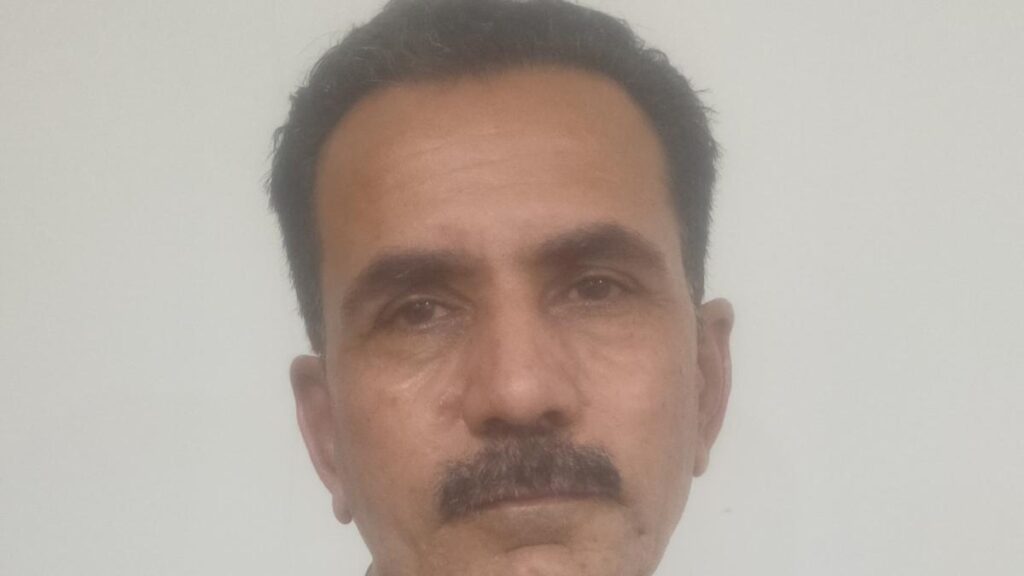
Nanikraz Khanoomal Mukhi, who had a sonography clinic in Pakistan’s Hyderabad, chose to move to India in 2009 for his children’s education and to escape possible religious persecution.
| Photo Credit: Special arrangement
A 50-year-old doctor from Pakistan has been “stateless” for the past four years and decided to move the Gujarat High Court with the hope of pushing officials to help him secure Indian citizenship.
Nanikraz Khanoomal Mukhi, who had a sonography clinic in Pakistan’s Hyderabad, chose to move to India in 2009 for his children’s education and to escape possible religious persecution.
After settling down in Ahmedabad, Gujarat, where his relatives are residing, Dr. Mukhi applied for citizenship in 2016.
In 2021, he received a letter from Ahmedabad Collector’s office that the application has been processed and he would receive the citizenship soon.
This is when Dr. Mukhi’s troubles began.
Also read: India’s citizenship laws: The Constituent Assembly dilemma
‘Like an open jail’
“On receiving the letter, I went to Pakistan High Commission in Delhi, surrendered my Pakistani passport and renounced Pakistani citizenship. However, the citizenship certificate never arrived and for the past four years I am living as a stateless person. It is like being in an open jail. I have no nationality,” Dr. Mukhi told The Hindu.
After writing letters and visiting the Ahmedabad Collector’s office multiple times, Dr. Mukhi moved the Gujarat High Court against the Union of India and State of Gujarat on April 30.
“The Union government is yet to file a reply, the case keeps getting adjourned. This is grave injustice. We left Pakistan to make a better life here. I was worried about my daughter’s safety. There are several cases of forcible conversion of women there. But now I am being made to suffer here because government officials have chosen to look the other way,” Dr. Mukhi said.

The next date of hearing is August 6.
Wife, children secured citizenship
Dr. Mukhi’s wife, who had applied for citizenship with him, has been granted the naturalisation certificate. His three children acquired citizenship after they registered under the Citizenship Amendment Act (CAA), 2019 which became effective on March 11, 2024.
Citizenship is a subject under the Union List and is decided by the Ministry of Home Affairs. The Ministry has, however, periodically delegated powers to district magistrates/collectors of 31 districts in nine States to grant citizenship to legal migrants (who entered on passport/visa) from the Hindu, Sikh, Buddhist, Jain, Parsi and Christian communities from Pakistan, Bangladesh and Afghanistan under Section 5 (by registration) and Section 6 (naturalisation) of the Citizenship Act, 1955.
He added that he too applied for citizenship under CAA in 2024 but his application is pending.
Though CAA is for undocumented migrants from the three countries, the online portal asks applicants to provide any six types of documents and specify “date of entry” in India. The applicants are also asked for an “eligibility certificate” issued by a “locally reputed community institution” confirming that he/she belongs to “Hindu/ Sikh/ Buddhist/ Jain/ Parsi/ Christian community and continues to be a member of the above mentioned community.”
The empowered committee, which grants citizenship under CAA, is headed by Director (Census Operations) in each State.
“The Census official told me that my application [under CAA] is pending as I applied through Collector’s office and renounced Pakistani citizenship on the basis of a letter,” Dr. Mukhi added.
Published – July 19, 2025 10:01 pm IST


